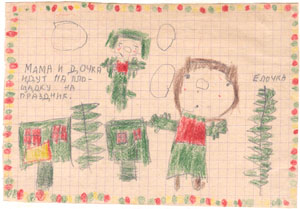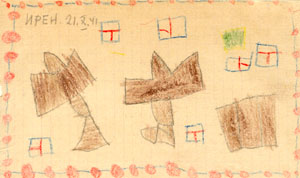
Working and Living in the KindergartenCHAPTER 4 When we reached the kindergarten the previous director was still there. I had to learn the basics of bookkeeping and management at their most primitive level. Soon she left and I was left all alone to deal with strangers in an unfamiliar situation. In addition to everything Iren had a bad case of diarrhea and, while suffering herself, she tormented me as well. She was cured by the advice received from a very elderly doctor who lived in the sovkhoz. He told me to give her several times a day some grated dry bread mixed with egg-white. Iren got better and soon she could eat everything without any trouble. I remember that before getting the old doctor's advice I even went to a nearby summer camp and tried to ask them for a bit of rice. I got it too, about a quarter of a glassful of it. I was very thankful… The kindergarten occupied two rooms on the second floor of a large house. One served as our bedroom at night and during the day the children played and studied in both of the rooms. The cook, Aunt Lyuba, and the woman who was in charge of our supplies and other material needs lived on the first floor. Lyuba "weighted" the foodstuffs, brought the milk, made the porridge and divided the bread rations. She asked me to sign for all the foodstuffs. Apart from the bread that I got as part of the meals in the kindergarten I also received the additional ration of 800 grams of bread per day from the sovkhoz. This was a lot. I could change some of it for some milk and eggs for Iren, so that she should get some additional nourishment. Iren joined the kindergarten group made up of 15 children. The eldest girl, Galya, was 8 and the youngest boy was 3. Galya should have gone to school, but her parents decided that she should spend another year in the kindergarten. The reason for this was simple: kindergarten children received three meals a day while children at school did not get any food. The local children had their hair cut very short. When they came in the morning they were usually dirty, with dirty fingernails and many came barefoot as it was still summer. I wanted very much to put things in order and to run the kindergarten in the way it would have been run in Riga. I therefore started a small "campaign": first of all, I demanded that the children should wash themselves well at home before they came, that they should have their nails cut and hair combed. This went relatively easy. I did not have any problems with any of the lessons, after all I had worked with pre-school children for 7 years. We sang and painted and did embroidery, I told them children's tales and recited poems from memory, etc. Iren took part in all the lessons. This is one of her drawings done, I think, in August 1941. The inscription says: "Mother and daughter are on their way to the playground during a holiday." Here is another of her drawings, this one is "about the war".
I still have my notes about Iren during that period. "She clings to me even more than in Riga, she kisses me and hugs me and demands my attention. She keeps saying that I am the best mother ever and that she shall never give me away to anyone, even to someone who does not have a mother. …She remembers quite a lot…. She told me in detail about the summer camp, about the shooting there, about the time when she had to sleep in the cellar together with Berta, about the arrival of the little Yurik Berkovich and about the fact that they had to sleep in the same bed "because Yurik's bed was not brought along…" And here are some of the things she said: "I was afraid of the kitten before and now I have courage for the kitten!" "Rice was not tasty before and now it grew more tasty…" "Mum, do the leaves make the wind happen or it appears by itself?" This is how our days passed. We grew accustomed to many things. Our "economic" situation was more complicated. As soon as I demanded that Aunt Lyuba should weigh and distribute the food in someone's presence and that she should keep a record of what she did, she grew very angry and resorted to "sabotage". She soon resigned. Everything was difficult. My sole source of satisfaction was the fact that now the parents kept saying that the children came home after they had enough to eat and they did not ask for more food. When the kindergarten was closed for two weeks for repairs and I gave out everyone their two-weeks' food rations, as I was supposed to, the locals found it extremely surprising… While we lived in the sovkhoz I managed to find some of my friends and relatives. I received a letter from Haya P., from Hanze Slovin who was in Chuvashia, from Nata Busse. One beautiful day I received a letter from Zyama! Later on I had a letter from Fanya , Zyama's wife, about whom I kept thinking again and again: at the time when the war started she was due to have her baby. One day I was standing outside, in freezing cold, chopping wood for our stove. For the first time in my life I was chopping wood. I wore my rather light and once elegant coat, men's shoes that I managed to buy somewhere, a beret and a pair of thin beige gloves that had been mended many times. I received those gloves from an inspector of the Regional Education Department who had noticed that I had not been wearing gloves in winter. She apologized that her gloves had holes in them, but I mended them and however thin they were they did warm my hands a little bit. Here I was chopping wood when I saw the postman. There was a letter for me – from Fanya! I read the letter and tears kept pouring from my eyes. Fanya wrote how she had been taken off the train at Bezhetsk and taken to the hospital to give birth. It took her three long and difficult days to give birth to her son. "I gave birth under sedation and I gave him his name under sedation too" – she wrote. She wrote that after being given sedation she started speaking about everything, about Benno, how he was shot and how he died in prison. While still under sedation she requested that if she will have a boy he should be named Benno. When she woke up later she was told: "You have a son and his name is Benno!" I read the letter again and again and cried… I did not want to work as the director of the kindergarten. It was hard to walk to Yaroslavl 17 kilometers to go to the bank or to the Education Department. It was nice if sometimes I could get a lift on a cart going from the village where the kindergarten was to the sovkhoz or a cart going in the direction I needed, but very often I had to walk in cold and rain and at night too. My light coat did not help me much in freezing winter either. In the end I requested that a new director be sent to manage the kindergarten and I would work as a kindergarten teacher only. A new director was sent and it was easier for her to keep contacts with the locals in order to provide what the kindergarten needed. I was happy just to work with the local children… Then the day came when I received a telegram from Kirov, where the evacuated government of Soviet Latvia was now located. The telegram was addressed to the Education Department of the Yaroslavl Oblast (District) to provide for my urgent departure to Kirov to work in an orphanage for children evacuated from Latvia. The telegram was signed by A. Deglav, one of the top party officials. It was followed by an order sent to the local Education Department ordering to release me from my appointment at the sovkhoz kindergarten. It was clear that we should start preparations to leave. I had prepared some black bread rusks and I also had some hard wheat cookies that I kept for Iren, in case she might have another bad case of diarrhea. (I was badly scared that this might happen again.) …After we packed our belongings it became clear that we have amassed some "property". There was my suitcase, another one with Iren's things and a sack with a thin blanket, a pillow, some crockery, the dried bread I had prepared, etc. After my numerous visits to the sovkhoz office I was told which car will take us to Yaroslavl. We drove in the evening and it transpired that the car by which we travelled will not reach Yaroslavl, but will turn off the main road somewhere not far from it. The driver did me a favor and brought us as close to the evacuation centre in Vspolye as he could. So, I found myself with Iren and our belongings at the side of the road all alone, as the lights of the car disappeared in the near-darkness. I asked someone how far it was to the evacuation centre and was told that it was not far: some six hundred meters or maybe a kilometer. It was getting really dark now. I told Iren to stay near the sack and took the two suitcases and went forward. I soon realized that I cannot carry two of suitcases and left one on the side of the road, carrying the other one further on. Then I came back, called Iren and picked up the sack. These manipulations continued for some time, but we were not able to move much. Suddenly an elderly man appeared nearby. He asked: "Where are you going?" I told him that we were heading for the evacuation center and he silently put the sack on his back, picked up one of the suitcases and said: "Let's go! Little girl, you hold on to the suitcase and walk with me!" He started off, Iren ran along to keep up with him and I, carrying the other suitcase, found it hard to do so. Iren kept calling me: "Mum, where are you?" I kept telling her to keep going while I myself could hardly see where we were going and was afraid to fall behind… In the end we reached the evacuation center. If it was not for this man I really do not know how we would have managed to get there. I remembered him and his good deed for many years but at that time all I could do to thank him was to give him the loaf of bread they gave us at the sovkhov "for the trip". He did not want to take it but I managed to convince him. At the evacuation centre they gave us places to sleep in a large room with several rows of beds. Suddenly heavy bombing started. It transpired later that this was the heaviest bombing the town of Yaroslavl ever suffered. I sat on the bed, tightly embracing Iren, Some of the people ran away somewhere, but we stayed where we were, and when I heard the explosions I only had one thought on my mind: if we have to die, let us die together… Then the bombing ended. The people came back, the lights went on in the room. No-one spoke much and we all went to sleep.
|


